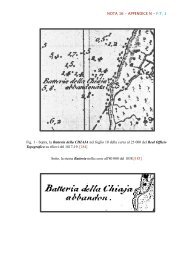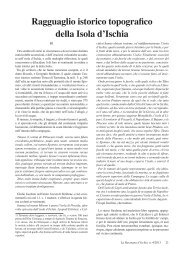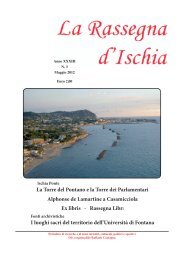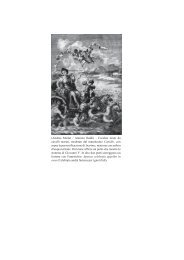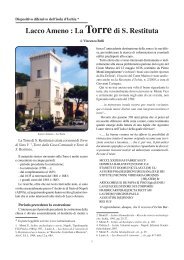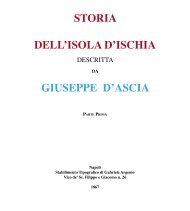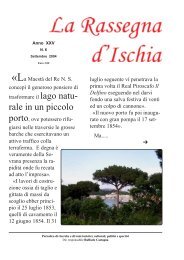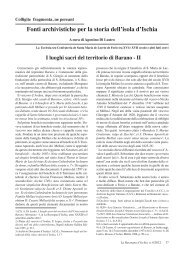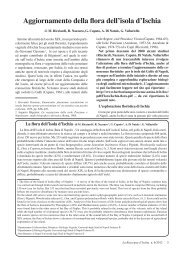§ 121. Interrogativikí, kə, kwálə: uso pronominale e aggettivale. Pronominale kwálə rafforzatoda ipse: kwálíssə, kwálę́ssə.4. Numerali§ 122. únə, láwyə (aggettivale m. lúyə, f. lǫ́wyə, protonico lú, ló), tráyə(protonico trẹ), kwáttə, ćíŋk, sę́yə, sę́ttə, ǫ́ttə, nǫ́və, lyę́ćə, únnəćə, lúlićə,trílićə, kwartwǫ́rlićə, kwínnəćə, sílicə, ləćəsę́ttə, ecc.; vínt, trę́nt, səttánt,ottánt, nuwánt, cyę́nt, lùćyę́nt, trìćyę́nt, kwàttićyę́nt, ecc.; míddə.5. Flessione verbaleIl sistema <strong>di</strong> flessione è semplificato su due coniugazioni: la flessione<strong>di</strong> - a e quella associata alla II, III e IV coniugazione. Inoltre si consideranoanche le forme incoative più remote nella flessione <strong>di</strong> - i.Desinenze§ 123. L’infinito è l’unica forma verbale in cui ancora si <strong>di</strong>stinguono quattroclassi <strong>di</strong> coniugazione: I. –á; II. -ę́, -ę́yə, -áyə; III. -ə; IV. -í.§ 124. Presente in<strong>di</strong>cativo:I. 1. -‘ə, 2. -’ə, 3. -‘ə, 4. -ámmə, 5. -ę́tə (8), 6. –‘ənə.II. 1. -‘ə, 2. -’ə, 3. -‘ə, 4. -ímmə, 5. -ítə, 6. –‘ənə.Incoativo: 1. -ę́yškə, 2. -íšə, 3. -ę́šə, 6. -ę́šənə.§ 125. Il presente congiuntivo non si usa; soltanto: pwǫ́ttsə (8), pǫ́ttsa“possa”, con cui il congiuntivo si scrive nelle proposizioni principali cheesprimono un desiderio.§ 126. ImperativoI. 2. –‘ə, 5. -ę́tə. II. 2. –‘ə, 5. -ítə. Incoativo: -íšə, -ítə.cause avec lui; afrz. L’empereur Kyrsac de Constantinoble, que uns siens freres li avoit tolul’empire..... Lerch spiega questo modo <strong>di</strong> esprimersi così: “che in un punto del relativismo,che ha nello stesso tempo funzione subor<strong>di</strong>nata e pronominale, avvenne una<strong>di</strong>visione in cui innanzitutto la semplice subor<strong>di</strong>nazione si espresse me<strong>di</strong>ante que e lafunzione pronominale con il pronome personale in questione”.8) Con metafonia a > e come in § 1.72
§ 127. Imperfetto in<strong>di</strong>cativo:I. 1. -ávə, -ę́və (ve<strong>di</strong> in nota 1), 3 -ávə, 4. -ávənə, (9) 5. -ę́vəvə, 6.-ávənə.II. 1. -ę́yvə, 2. -ívə, 3. -ę́yvə, 4. ę́yvənə, 5. -ívəvə, 6. -ę́yvənə.§ 128. Imperfetto congiuntivo:I. 1. -ássə, 2. -ę́ssə, -ássə, -ássənə, -ę́ssəvə, -ássənə.II. 1. ę́yssə, 2 -íssə, 3. -ę́yssə, 4. -ę́yssənə, 5. íssəvə, 6. -ę́yssənə.§ 129. Passato remoto:I. 1. -ę́yə (con metafonia a > e), 2. -ę́stə, 3, -áyə, 4. - ę́nnə, 5. - ę́stəvə,6. -áyənə.II. 1. - yę́ttə, 2. -ístə, 3. - ę́ttə, 4. -yę́ttənə, 5. -ístəvə, 6. - ę́ttənə.§ 130. Futuro:In genere viene sostituito col presente (10).I. II. 1. arrǫ́ģģə, 2. manca, 3. –arrá, 4. 5. mancano, 6. -arránnə.Inoltre: II. 1. -ərrǫ́ģģə, 3. -ərrá, 6. -ərránnə.§ 131. Con<strong>di</strong>zionale:I. II. 1. -árryẹ́, 2. -arríssə, 3. -árryẹ́, 4. -arryénnə, 5. -arríssəvə, 6.-arryénnə.§ 132. Gerun<strong>di</strong>o:I. -ánnə. II. -énnə.§ 133. Participio passato:I. -ę́tə (m.), -átə (f.). II. -útə.9) <strong>La</strong> –n- della quarta persona dell’imperf. ind. e cong. in -ávənə, -ę́yvənə, -ássənə,-ę́yssənə è basata <strong>sul</strong>l’adeguamento nella 6. pers. per analogia al sing. dove 1. e 3. perssono uguali; -n- al posto <strong>di</strong> –m- si trova anche nel calabrese (cfr. Accattatis – Vocab. del<strong>di</strong>al. calabrese 1895 – p. XXXII mangiavanu, currianu, nel lontano aretino e canavese(prov. Torino), cfr. Arch. Gl. It., p. 897, 452, 453, dove Ascoli trova la spiegazione nellaposizione finale della –m- per apocope. Per l’antica desinenza –iano della 1. plur. MeyerLübke vede il punto <strong>di</strong> partenza in combinazioni come repetianci, an<strong>di</strong>ancene (It.Gr. § 391; cfr. anche Grundr. I, p. 684).10) cfr. AIS, K. 9, 10, 11 “quando mio figlio sarà grande lo manderò....”.73
- Page 1:
I dialetti d’IschiaNella tesi di
- Page 5 and 6:
dare il nome al signore; “Re Tamb
- Page 7 and 8:
IntroduzioneStoria dell’isola d
- Page 9 and 10:
si spinsero a Cuma, il più antico
- Page 11 and 12:
Nell’età delle invasioni barbari
- Page 13:
molte case con copertura leggerment
- Page 16 and 17:
kwárt “quarta”;yánk “bianca
- Page 18 and 19:
vicinissimo alla citata località d
- Page 20 and 21:
škǫ́rts, f. “buccia di noce, d
- Page 22 and 23: e ddę́ytə “le dita”;a kunáy
- Page 24 and 25: nəpáwtə "nipote" < nepotemćǫ́
- Page 26 and 27: B. Vocale postonica§ 13. Tutte le
- Page 28 and 29: una forma corretta senza la citata
- Page 31 and 32: che essa si trovi in vicinanza di a
- Page 33 and 34: t§ 36. All’inizio e all’intern
- Page 35 and 36: che qui si conservi, poiché essa s
- Page 37 and 38: pl. e bbǫ́wttə; vǫ́wkkə „bo
- Page 39 and 40: s (= cl. lt. s, -ns-)§ 43. In fase
- Page 41 and 42: Con la completa caduta: ģáwnə (8
- Page 43 and 44: 5641; mustárdə, f. “uva cotta
- Page 45 and 46: Suff. -ələ < -ŭlu, -a; -álə <
- Page 47 and 48: D. I principali nessi delle consona
- Page 49 and 50: “borsetta”; túrts “torsolo
- Page 51 and 52: lt > *wt > vet in: sǫ́vətə “s
- Page 53 and 54: Ma: vyę́rrə „inverno“: con a
- Page 55 and 56: § 80. ns (< in + s-, x-) > ndz: nd
- Page 57 and 58: schiantare „scoppiare”; šc῎
- Page 59 and 60: çukká (224) „nevicare”, “fi
- Page 61 and 62: centesimi” (“grano“) (240), m
- Page 63 and 64: § 97. Su g in posizione iniziale <
- Page 65 and 66: -ndz- < -nti: akkuməndzá “incom
- Page 67 and 68: E. Rafforzamento iniziale all’int
- Page 69 and 70: Morfologia e sintassi1.NomiPer la d
- Page 71: te”; tu wọ́ pəg῎ g῎á a mm
- Page 75 and 76: Cong. Imperf. 1. avę́yssə, ecc.I
- Page 77 and 78: § 150. Anomalie della 1. pers. sg.
- Page 79 and 80: Con la Campania soltanto Fontana di
- Page 81 and 82: tráyə. a matráyə vulę́yvə ma
- Page 83 and 84: yę́šə, yę́šə a reģínə,k
- Page 85 and 86: kāa trasí a reģínə!ẹ u rráy
- Page 87 and 88: 5. Versi, recitati durante la vende
- Page 89 and 90: Indovinelli1. Tǫ́mbolí kə ttumm
- Page 91 and 92: Glossarioabbíətə - va!abbáwkkə
- Page 93 and 94: per ragazza: nennella"bambinella" (
- Page 95 and 96: Elenco delle sigle die testi consul





